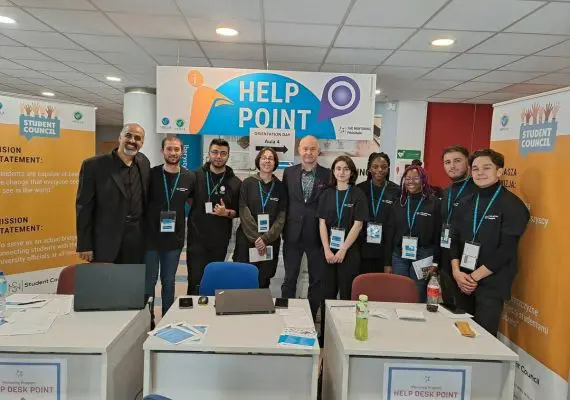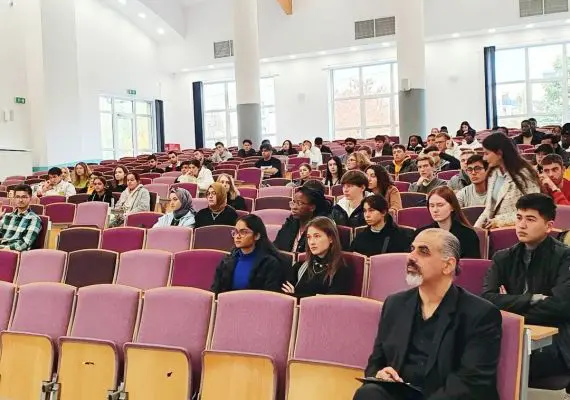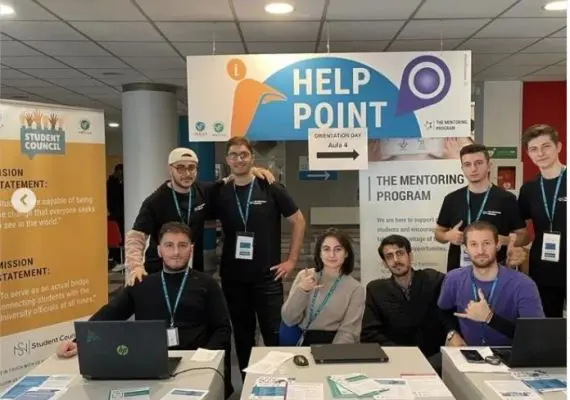Discover the Mentoring Program
Discover the Mentoring Program
The Mentoring Programme was created to support and encourage new students to manage their own learning. Our goal is to help them maximise their potential, develop their skills, and improve their performance. The Programme has been successfully running at Vistula University, since December 2015.

The main aims of the Mentoring Program are to make the new students’ university life simpler, comfortable, meaningful and colorful. A Mentor, on the other hand, can benefit from the Program by getting a chance to understand a new culture.

How it works
- A dedicated person (Mentor) supports, teaches, leads and serves as the model for a freshman student.
- Peer mentoring model is implemented in Vistula University.
- Mentoring can also be initiated by a Mentee and can happen informally when an individual seeks advice and support from someone else.
- Mentoring is only one form of support. Individuals may be supported in other ways, e.g. by colleagues (peer support), line managers, counsellors, tutors/teachers and groups. It is important to recognize that an individual may have a variety of support, for a variety of reasons, including more than one mentor, at any given time and that this structure of support may vary over a period of time.

Who is a Mentor
Mentors are volunteers who offer their time to help new students make positive changes in their lives. A mentor is a guide who can help the mentees find the right direction and who can help them develop solutions to any problems.
FAQ
Who can become a Mentee?
Do You Want Support on Your Career Journey?
Would you like to receive voluntary support from a peer who has walked the same path in your career journey?
What Qualities Are We Looking For?
• Being a freshman or sophomore student,
• Willingness to improve in career and academic development topics,
• Ability to attend program meetings throughout an academic semester.
Mentee's Benefits
- Receive guidance from 2nd and 3rd-year career mentors who have completed various professional development trainings, including:
- Learning about Poland from experienced mentors for quick adaptation,
- Self-discovery and exploring career interests,
- Building a professional network,
- Personal branding,
- Preparing effective resumes and LinkedIn profiles,
- Preparation for interviews,
- Information on internship and job opportunities.
- Benefit from the experiences of other mentees in the group.
- Gain necessary skills for preparing for professional life.
- Get ahead in internship applications with regular support.
- Stay informed about campus and off-campus career services and events.
How to become a Mentor?
What Qualities Are We Looking For?
• Being a 2nd or 3rd-year student,
• Being able to dedicate regular time to the program and meetings,
• Having communication and presentation skills,
• Being inclined towards both leadership roles and teamwork,
• Being interested in personal and career development topics.
Mentors Benefits
- Gain advantages in career planning by receiving training from experts in professional life and career development.
- Strengthen leadership, communication, teamwork, and presentation skills by sharing
what you’ve learned with mentees and providing necessary guidance. - Gain leadership experience with mentees and participate in specially designed
leadership development activities throughout the semester. - Mentors who successfully complete the program earn an “Academic and Career Mentor”
certificate. - Priority is given to mentors in internships and job placements within the university.
- Academic and Career Mentors benefit from internship and job opportunities from companies partnered with the university.
A mentor:
- Has the universal ethical and moral principles.
- Is well aware of the University’s internal organization.
- Accepts program steps, rules and responsibilities during the process
- Provides accurate information during the application process.
- Takes part in educational and starting meetings before the matching phase.
- Takes part in surveys and evaluations. Supports activities during the learning
process. - Within one year stays connected with the program for at least 8 months.
- Supports the process of giving feedback, reporting and evaluation throughout the
program.

